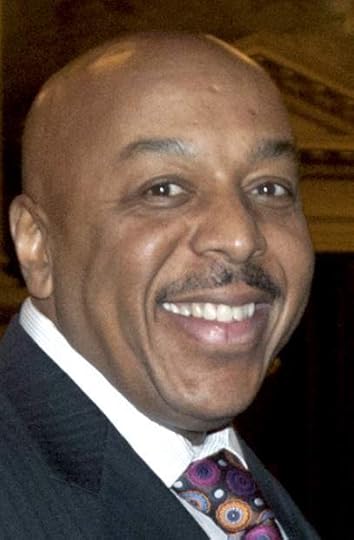Thomas Barr Jr.'s Blog, page 7
October 5, 2015
Philadelphia legislator, former lawmaker plead guilty in bribery scandal Read more: http://triblive

Story By Brad Bumsted
HARRISBURG — A state lawmaker and an ex-representative, both Philadelphia Democrats, pleaded guilty Monday to criminal charges stemming from a bribery scandal and received probation.
A third legislator withdrew her plea.
Rep. Ronald Waters, 65, in office since 1999, resigned immediately. Initially charged with bribery, he pleaded guilty to nine counts of conflict of interest.
“I
got caught up. I don't know where my mind was,” Waters said in an apology to the court.
Dauphin County Judge Scott Evans said he didn't “see it as corruption, to the degree of organized crime infiltration.” The
judge called it “poor use of judgment.”
He sentenced Waters to 23 months' probation and ordered him to pay $8,750 in restitution, $5,000 in court costs and a $200 fine for accepting $8,750 from undercover informant
Tyron Ali. In their meetings, Waters agreed to act on liquor privatization, with the Philadelphia Parking Authority, and to vote against the voter ID bill, prosecutors said.
Former Rep. Harold James, 72, pleaded guilty to one
count of conflict of interest and received 12 months of probation. A former police officer, he admitted taking $750 as a campaign contribution. He must pay $750 in restitution, costs of $5,000 and a $100 fine.
James also admitted
to the grand jury he would have taken official action, if asked, to help the would-be lobbyist working as an informant in an elaborate sting.
James' lawyer, W. Chris Montoya, told reporters his client's crime stemmed from being
“honest.”
“It was the intent,” Montoya said.
The pleas do not automatically mean James and Waters will lose their state pensions, said Deputy District Attorney Mark Gilson
of Philadelphia.
“We're satisfied with the outcome,” Gilson said. “That sentence was totally up to Judge Evans.”
Rep. Vanessa Lowery Brown, D-Philadelphia, withdrew a signed
plea agreement when she appeared for court, prosecutors said. She returns to court June 13.
Brown, 48, admitted to the grand jury that she took money from Ali, prosecutors said, accepting five payments totaling $4,000.
“It's a little problematic” in light of her grand jury statement, Philadelphia Deputy District Attorney Brad Bender said of Brown's plea withdrawal.
The cases were heard in Dauphin County because
crimes occurred in Harrisburg and Philadelphia. Attorney General Kathleen Kane, who referred the cases to Philadelphia District Attorney Seth Williams, had declared them “dead on arrival,” Gilson said after the hearing.
Kane
claimed “racial targeting” tainted the case, though the grand jury found no evidence of racism.
Kane “stands by her decision not to prosecute the African-American legislators,” said her spokesman, Chuck
Ardo.
Ali posed as a lobbyist for fictitious companies. Wearing a recording device, he taped nearly 400 hours of the bribe exchanges, documents show.
Ali cooperated with state prosecutors because
he faced 2,088 criminal charges alleging he defrauded the Department of Education when he operated a day-care center in Philadelphia. Charges against him were dropped.
Two other Philadelphia Democrats are charged in the case,
Reps. Michelle Brownlee and Louise Bishop. Brownlee is accused of accepting $3,500; Bishop, $1,500.
Bishop, 81, is expected to fight the charges in court Friday. Her attorney, Charles Peruto, said he subpoenaed five prosecutors,
including Williams and Assistant District Attorney Frank Fina, who headed the sting investigation when chief deputy attorney general, and two of Kane's staffers.
Peruto said he will prove there was racial targeting, calling Kane's
statements “100 percent accurate.”
“It's frivolous and baseless,” Gilson said of Peruto's claim.
Brownlee, 59, is scheduled to appear in court Monday.
September 25, 2015
Dirty Politicians
 By Jerry K. Remmers
By Jerry K. Remmers Every newsperson,
every website, every blogger in the United States at this very moment has an opinion on the latest inductee into the Corrupt Politicians Hall of Shame.
If it weren’t for such a tough name to digest, Illinois Gov. Rod Blagojevich would be a household
name for the ages.
If any of the criminal charges brought against him are true, he will make yesteryear’s Tammany Hall and Tom Pendergast look like a bunch of kids playing dice on the streets of New York and Kansas City.
Nearly all of the
charges against Blagojevich came from court-appointed wiretaps. Thus, they probably are true. Whether they all stick is another matter. The conclusion in the court of public opinion is he is guilty as hell. Innocent until proven guilty be damned.
Blagojevich
will go to the head of the class in college political science courses discussing politicians breaching the public trust.
What a shame. Politicians have a thankless task. Most do the best they can even if some of them aren’t the brightest lights
in the room. All we ask as voters is at least be honest.
Blagojevich is the latest in a series of corrupt Illinois governors, all of whom had associations with the political power players in Chicago, a city better known for physical toughness than ethical
standards.
Otto Kerner, a Democrat who was governor from 1961 to 1968, was convicted in 1973 for bribery, tax evasion and other counts.
George Ryan, a Republican who was governor from 1999 to 2003, was convicted of corruption in 2006 for steering
state contracts and leases to political insiders while he was Illinois secretary of state and then governor.
William Stratton, governor from 1953-1961, was later indicted but then acquitted on charges of income tax evasion.
Illinois and Chicago
in particular don’t have a monopoly on political corruption. They just get caught more often than not.
I was raised in California where politics is as rough and tumble as anywhere. The liquor license scandals in Los Angeles were notorious.
Nefarious dealings in Sacramento where governors exchanged jobs with senators was the norm when the Republicans were in power. Gov. Earl Warren returned so many favors he was appointed Chief Justice of the U.S. Supreme Court.
House Speakers Jesse
Unruh and Willie Brown remain political legends in the state.
Whether any of them were on the take, no one knows. There were no wiretaps in those days.
What is sad is that skeptics point to the Blagojevichs and others in the latest criminal crop
from Congress and the state capitols and justify their opinion that all politicians are crooks.
Public opinion paints a broad swath. It stains those who do good.
It should not be understated that Barack Obama’s transition team rejected
overtures from Blagojevich for political favors in exchange for his senatorial replacement appointment.
With a dirty Chicago political infrastructure, the Tony Rezko influence maker, the Rev. Jeremiah Wright and other creeps at his feet, it is a miracle
Obama has remained Teflon clean.
So far.
September 21, 2015
Four Prominent Chilean Politicians Are Charged With Tax Fraud

SANTIAGO, Chile — Four prominent opposition politicians and members of Chile’s
Congress were charged Monday with tax fraud in a high-profile corruption case related to illegal campaign financing.
These are the first politicians to appear before
a court as prosecutors unravel a vast system in which the financial holding firm Penta and the mining giant SQM, among other companies, appear
to have illegally channeled campaign funds to dozens of candidates across the political divide over the past decade.
Prosecutors accused the four — Senator
Iván Moreira; Congressman Felipe de Mussy; Jovino Novoa, a former senator and official in Gen. Augusto Pinochet’s dictatorship; and Pablo Zalaquett, a former mayor in Santiago — of using trusted individuals and firms as intermediaries to
issue false invoices to these companies in order to obtain funds for their campaigns. They are all members of the right-wing opposition party Independent Democratic Union, known as U.D.I.
Judge Juan Carlos Valdés ordered Mr. Zalaquett under partial house arrest during the investigation, and though prosecutors requested house arrest for Mr. Novoa, he was rushed out of the courtroom and into
a clinic after a sudden drop in his blood pressure. Judge Valdés will decide the matter on July 6.
Mr. Moreira and Mr. de Mussy have parliamentary
immunity, which the Supreme Court may eventually revoke as the investigation continues.
The national prosecutor, Sabas Chahuán, showed
evidence Monday that Mr. Novoa had instructed his secretary and the U.D.I.’s former chief of communications to issue false invoices to Penta.
Another
prosecutor, Carlos Gajardo, charged that Mr. Zalaquett had had two companies issue false invoices to eight firms to finance his 2013 failed candidacy to the Senate. “They include a variety of companies: from banks to large retail stores, real estate
companies, SQM, and smaller companies,” he said. SQM refers to Sociedad Química y Minera, a Chilean chemical company.
A fifth politician, Alberto Cardemil,
a former congressman for the rightist party Renovación Nacional who served as undersecretary of the Interior Ministry under General Pinochet, was expected to be charged Monday, but his hearing was postponed so his lawyers could assess new charges filed
late last week.
The sweeping investigation began with an anonymous tip to the Chilean tax authorities last August that led prosecutors to conclude that Penta was illegally
financing U.D.I. candidates and evading taxes in the process. Within months, investigators revealed a widespread system involving a broad array of companies and used by most of the political establishment, including the two main opposition parties on the right
and the center-left New Majority coalition now in power, with the exception of the Communist Party.
In March, a
court charged Penta owners and executives, members of Chile’s Internal Revenue Service and a former government official with tax fraud, bribery and money laundering. Four of the 10 men were taken into custody but were eventually released pending
trials.
September 11, 2015
Bharara: NYers should be outraged over corrupt politicians

Story by Antonio
Antennuci , Sophia Rosenbaum and Laura Italiano
Get angry, New York.
In a rousing
speech made one day after the bust of state Assembly Speaker Sheldon Silver, Manhattan US Attorney Preet Bharara urged state residents to voice their outrage over the “cauldron of corruption” that is Albany.
“People need to demand
more,” Bharara said Friday, addressing 350 students, faculty and invited dignitaries at an event hosted by the Center for New York City Law at New York Law School.
“It’s not just enough to be fed up,” the prosecutor told the
overflow crowd, which included former Mayor David Dinkins, former mayoral candidate and MTA chairman Joe Lhota and city Special Commissioner of Investigation Richard Condon.
“When in New York, politician after politician after politician breaks
bad, that’s a time to say no more half-measures,” he said.
“And, I think, given the interest and the attention to some of the cases we brought and continue to bring, this can finally be perhaps a turning point for reform.”
Bharara didn’t mention Silver by name during the 25-minute speech that toggled between emphatic and humorous — and included a gamut of references from Bruce Springsteen to Edward R. Murrow to ’70s sitcoms.
But the prosecutor repeatedly
referenced the speaker’s corruption case, which alleges Silver peddled his influence in return for more than $4 million in kickbacks and bogus legal fees.
“If ever there was a moment for real reform, I think it’s now,” he urged.
“And the public has to demand more.
“No state — no state — has people who are more thoughtful, more industrious, more resilient, more demanding and more impatient than New York,” he said.
“And if there was
ever a time for New Yorkers to show their trademark impatience with the status quo and to show it loudly, I submit now’s a good time for that.”
The mission of his anti-corruption prosecutors is simple, he said: “We simply want people
in high office to stop violating the law . . . People elected to make laws should not be breaking them.”
But break them they do, with disturbing frequency, Bharara said, noting, “Money often seems to be at the core of the problem.”
Case after case, public corruption has typically been about simple monetary greed, he said.
“We had a case against City Councilman Dan Halloran, which you may remember,” Bharara said, referring to the Queens Republican convicted last
July in a $200,000 bribery scheme.
“After allegedly receiving a $7,500 cash bribe, he says to the cooperating witness on tape, ‘Money is what greases the wheels. Good, bad or indifferent . . . That’s politics. That’s
politics. It’s all about how much, and that’s all our politicians in New York. They’re all like that. All like that.’ ”
Bharara asked the audience to next consider a snippet from the wiretap of state Assemblyman
Eric Stevenson, currently serving a three-year prison sentence after taking $22,000 in bribes.
“Here’s Eric Stevenson in his own words, as recorded in the case: ‘Bottom line, if half the people up here in Albany was ever caught for
what they do, they would probably be in jail.’ ”
How should these examples make New Yorkers feel, the prosecutor asked before answering his own question.
“As I’ve said before, I think the people of New York should
be disappointed, but they should be more than disappointed,” he said.
“They should maybe be angry. When so many of their leaders can be bought for a few thousand dollars, they should think about getting angry.
“When it is more
likely for a New York state senator to be arrested by the authorities than to be defeated at the polls, maybe they should think about getting angry.
“And they should ask some pointed questions. Given the allegations in case after case after case,
how many other pending bills were born of bribery?
“And worse, how many past bills were born of bribery or improper influence? How about items in the budget? How much of the work of the city and the state government is tarnished by tawdry graft?
“While I continue to believe that public corruption in New York is more than a prosecutor’s problem, you should rest assured that the people in my office are extremely busy and will continue to do what prosecutors do.
“And that
means being as aggressive and proactive on public corruption as we are on gangs and drugs and organized crime and insider trading and everything else.
“Because whenever corruption is on the rise, that means democracy is on the decline,”
he said.
Greed for cash has a co-conspirator, Bharara said — and that’s the problems endemic in Albany’s culture of entitlement and secrecy.
“It’s a lack of transparency, a lack of accountability and lack of principle
joined with an overabundance of greed, cronyism and self-dealing,” he said.
“I mean, it seems sometimes that Albany really is a cauldron of corruption.”
For emphasis, he quoted the iconic journalist Edward R. Murrow: “A
nation of sheep will beget a government of wolves.”
Bharara began his speech by joking that he hadn’t planned to talk at such length about public corruption when he agreed to give the speech a month ago.
“I was going to talk
about Bruce Springsteen,” he joked, name-dropping his favorite musician.
Bharara also took a veiled jab at Gov. Cuomo, whose own Moreland Commission panel tried to investigate Silver and other state lawmakers before the governor abruptly shut
it down.
The prosecutor said Thursday that his office merged its records with Moreland’s to put together the case against the speaker.
“The hope is — at least my hope is — that a byproduct of bringing powerful and strong
and righteous and appropriate cases is that there will be reform. And that almost happened with the Moreland Commission,” he said. “But it turned out to be a little bit fleeting.”
The prosecutor’s remarks were greeted with resounding
applause and a standing ovation by half those in attendance, including Lhota and Condon.



